Sony PCG-FRV31, PCG-FRV33, PCG-FRV34, PCG-FRV35, PCG-FRV37 User Guide

Welcome
Congratulations on your purchase of this Sony VAIO® computer, and welcome to the online VAIO® Computer User Guide. This user guide provides detailed information on all aspects of using your new VAIO computer, from keyboard functions to preinstalled software programs.
In the left navigation window, click the topics you want to learn more about, and that information will be displayed in this main window.
 View the Electronic Flyer, which provides updates and supplemental information about your computer.
View the Electronic Flyer, which provides updates and supplemental information about your computer.
 Go to the Sony Computing Support Web site to view the VAIO® Computer Specifications, which lists your computer's hardware specifications and preinstalled software information.
Go to the Sony Computing Support Web site to view the VAIO® Computer Specifications, which lists your computer's hardware specifications and preinstalled software information.
For Sony software information, click Start and select Welcome to VAIO Life.
Page 1

Caring for Your Computer
This section provides information on how to safely use your Sony computer.
Page 2

Applying Ergonomics
Your computer is a portable device and can be used in a variety of environments. Whenever possible, you should apply the following ergonomic considerations:
Position of your computer — Place the computer directly in front of you as you work. Keep your forearms horizontal, with your wrists in a neutral, comfortable position while using the keyboard, touch pad, or external mouse. Let your upper arms hang naturally at your sides. Take breaks during sessions with your computer. Excessive use of the computer may strain muscles or tendons.
Furniture and posture — Sit in a chair with good back support and armrests. Adjust the level of the chair so your feet are flat on the floor. A footrest may make you more comfortable. Sit in a relaxed, upright posture and avoid slouching forward or leaning far backward.
Viewing angle of the computer's display — Tilt the display to find the best viewing angle. Also try adjusting the brightness setting of the display. Following these suggestions can reduce eye strain and muscle fatigue.
Lighting — Choose a location where windows and lights do not create glare or reflection on the display. Use indirect lighting to avoid bright spots on the display. You can purchase accessories for your display that help reduce glare. Proper lighting adds to your comfort and work effectiveness.
Placement of an external display — When using an external display, set the display at a comfortable viewing distance. Make sure the display screen is at eye level or slightly lower when you are sitting in front of the monitor.
Page 3

Storing Your Computer
Do not use or store your computer in a location subject to:
Heat sources, such as radiators or air ducts
Direct sunlight
Excessive dust
Moisture or rain
Mechanical vibration or shock
Strong magnets or speakers that are not magnetically shielded
Ambient temperature higher than 95ºF (35ºC) or less than 40ºF (5ºC)
High humidity
Do not place electronic equipment near your computer. When running, the computer's electromagnetic field may cause other electronic equipment in close proximity to malfunction.
Provide adequate air circulation to prevent internal heat buildup. Do not place your computer on porous surfaces such as rugs or blankets, or near materials such as curtains or draperies that may block ventilation. Leave a space of at least 8 inches (20 cm) behind the back of the computer.
If the computer is brought directly from a cold location to a warm one, moisture may condense inside your computer. In this case, allow at least one hour before turning on your computer. If any problems occur, unplug your computer, and contact your Sony Service Center.
The computer uses high-frequency radio signals and may interfere with radio or TV reception. Should this occur, move the computer a suitable distance away from the radio or TV.
Do not drop the computer or place heavy objects on top of the computer.
Page 4

Using Cables and Connections
Use only specified peripheral equipment and interface cables.
Do not use cut or damaged connection cables.
If the telephone company makes a service call to your home or office and determines that your computer is responsible for a problem, the telephone company may bill you for the service call. Also, if you do not disconnect your computer when it is adversely affecting a telephone line, the telephone company has the right to disconnect your service until you correct the problem.
Page 5

Cleaning Your Computer
Clean the computer with a soft, dry cloth or a soft cloth lightly moistened with a mild detergent solution. Do not use any type of abrasive pad, scouring powder, or solvent such as alcohol or benzine, as these may damage the finish of your computer. You can use canned compressed air specifically for computers to remove dust.
If a solid object falls onto the computer or a liquid leaks into the computer, immediately turn off and unplug the computer. It is best to have the computer checked by qualified personnel before you use it again.
Avoid rubbing the LCD screen as this can damage the screen. Use a soft, dry cloth to wipe the LCD screen or canned compressed air.
Always disconnect the power cord before cleaning the computer.
Page 6

Handling the LCD Screen
Direct sunlight can damage the LCD. Be careful when using the computer near a window.
Do not scratch the LCD or exert pressure on it. This can cause a malfunction.
Using the computer in low temperature conditions may produce a residual image on the screen. This is not a malfunction. When the computer returns to normal temperature, the screen returns to normal.
The screen becomes warm during operation. This is normal and does not indicate a malfunction.
The LCD is manufactured using high-precision technology. You may, however, see tiny black points and/or bright points (red, blue, or green) that continuously appear on the LCD. This is a normal result of the manufacturing process and does not indicate a malfunction.
Page 7

Powering Your Computer
Your VAIO® computer comes with a battery and an AC adapter. This chapter explains how to install and use these supplied accessories to power your computer. It also describes ways you can efficiently utilize the battery as a power source.
Page 8

Using AC Power
The supplied battery is not charged when you unpack it. To use your computer immediately, attach the supplied AC adapter and use it to power your computer. See Using the Battery for more information on installing and using your battery.
Page 9

Connecting the AC adapter
To connect the AC adapter
1.Plug the AC adapter cable into the DC IN port.
Connecting the AC Adapter to the Computer
2.Plug the power cord into the AC adapter and an AC outlet.
Use only the supplied AC adapter with your computer.
Page 10
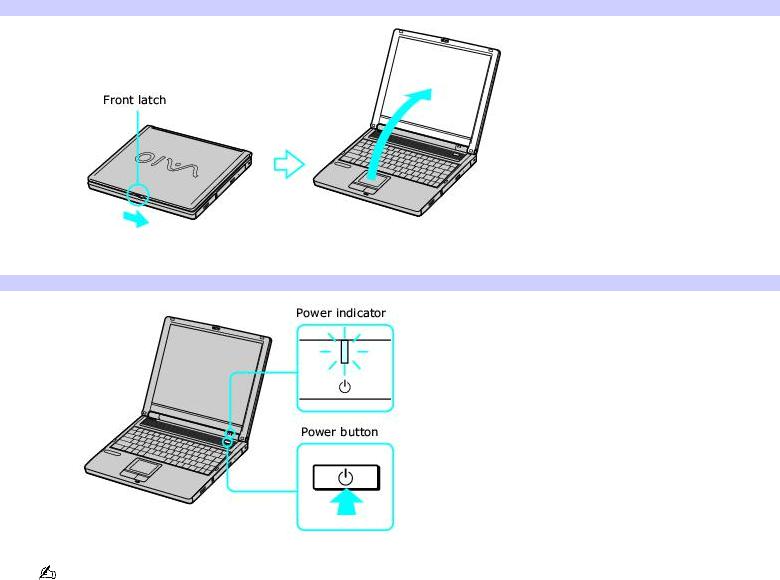
Turning on the computer
To turn on the computer
1.Slide the RELEASE latch to the right and lift the lid while holding the bottom of the computer firmly.
Opening the Computer
2.Press the power button until the power indicator turns on.
Turning on the Computer
If you hold the power button down, the computer turns off.
3.If the computer screen is too dark or too bright, follow these steps to adjust the brightness:
To increase brightness, press the Fn and F5 keys, and then press the Up Arrow  or the Right Arrow
or the Right Arrow
 key.
key.
To decrease brightness, press the Fn and F5 keys, and then press the Down Arrow  or the Left Arrow
or the Left Arrow  key.
key.
Page 11

Using the Battery
The supplied battery is not charged when you unpack it. To charge it for future use, install the battery, and then connect the AC adapter to power your computer. The battery charges from AC power regardless if the computer is on or off. For information on how to extend the life of the battery, see Conserving Battery Power.
Page 12
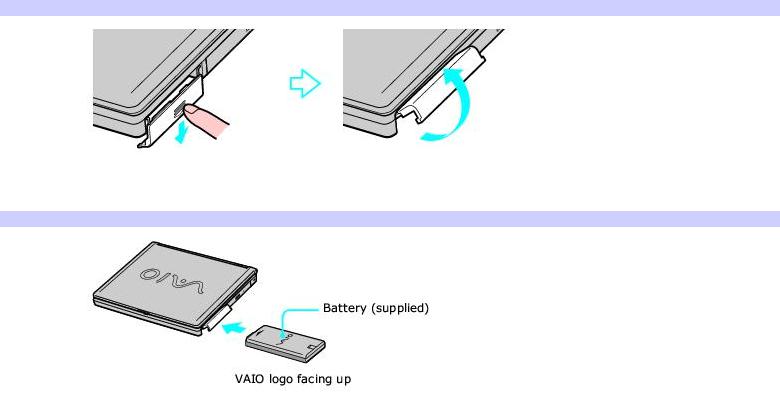
Inserting a battery
To insert a battery
1.Push the battery bay cover down to open it. The battery bay cover swings out but does not detach from the computer.
Opening the Battery Bay
2.Slide the battery (with the logo facing up) into the battery bay. If the computer is on, it automatically detects the battery.
Inserting a Battery
3.Push the battery bay cover up until it clicks into place.
Your computer can enter Hibernate mode while using battery power, but some software programs and peripheral devices prevent the system from entering Hibernate mode at all. If you are using a program that prevents the system from entering Hibernate mode, save your data frequently. Also, see To activate Hibernate mode for information on how you can manually activate Hibernate mode.
Page 13

Removing a battery
If you are not using the computer for an extended period of time, remove the battery from the computer to avoid damaging the battery. You can remove the battery when the computer is on or off.
 If the computer is on, connect the AC adapter and exit a power saving mode before you remove the battery.
If the computer is on, connect the AC adapter and exit a power saving mode before you remove the battery.
To remove a battery
1.Push the battery bay cover down to open it.
2.Pull the battery out of the battery bay.
3.Push in and lift up the battery bay cover until it clicks into place.
Removing a Battery
Page 14

Locating battery information
You can display information for each of the batteries installed in your computer.
To view battery information
1.Click Start on the Windows® taskbar, and click Control Panel.
2.Click Performance and Maintenance, and click Power Options. The Power Options Properties window appears.
3.Select the Power Meter tab. The total remaining battery charge is listed as a percentage. If your computer comes with more than one battery, you can view information on both batteries or just the primary battery.
 You may also use the power icon on the Windows® taskbar to quickly view battery information. See To display the power icon on the taskbar for instructions on how to set up this shortcut.
You may also use the power icon on the Windows® taskbar to quickly view battery information. See To display the power icon on the taskbar for instructions on how to set up this shortcut.
To display the power icon on the taskbar
1.Click Start on the Windows® taskbar, and click Control Panel.
2.Click Performance and Maintenance, and click Power Options. The Power Options Properties window appears.
3.Select the Advanced tab, and then select Always show icon on the taskbar in the Options box. The power icon appears on the taskbar. See the power icon descriptions below for more information.
You can rollover the power icon to view the remaining battery charge, and you can double-click the power icon to open the Power Meter window, which also displays the remaining battery charge.
Power icon Power status
Computer is using AC power.
Computer is using AC power and charging the battery.
Battery is charging.
Battery is fully charged.
Battery is discharging.
No battery is inserted in the computer.
Page 15
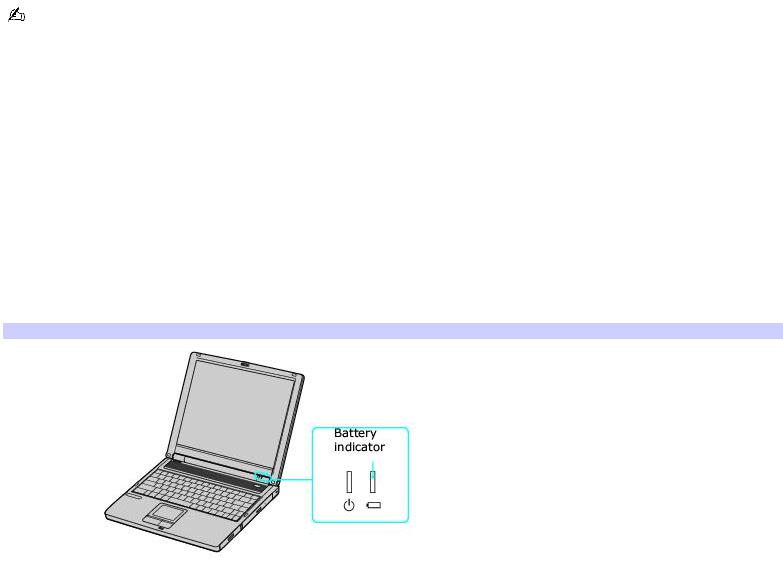
Charging a battery
You will need to charge the battery if battery power drops below 10 percent or you have not used the battery for a long time. The lithium-ion battery supplied with your computer may be recharged at any time, whether you wait until the battery is completely or partially discharged. Charging a partially discharged battery does not affect battery life. If you charge the battery and find that battery power is still low, the battery may be reaching the end of its life, and you may need to replace it.
The battery supplied with your computer is not charged at the time of purchase.
To charge a battery
You can charge the battery when the computer is on or off. However, the battery will charge faster when the computer is off. Charging the battery takes several hours. See your VAIO® Computer Specifications on the Welcome page for the approximate time needed to charge your battery.
 Charge the battery at temperatures between 50°F and 80°F (10°C to 30°C). Lower temperatures require more time to charge.
Charge the battery at temperatures between 50°F and 80°F (10°C to 30°C). Lower temperatures require more time to charge.
1.Insert the battery into the battery bay.
2.Connect the AC adapter to the computer. The computer automatically charges the battery as long as the computer is using AC power.
The battery indicator blinks while the battery charges. The battery indicator stops blinking when the battery is fully charged.
Battery Indicator
Battery indicator status |
Description |
On |
The computer is using battery power. |
Single blink |
The battery is running out of power. |
Double blink |
The battery is charging. |
Off |
The computer is using AC power. |
Page 16
Notes on batteries
Never leave the battery in temperatures above 140°F (60°C), such as under direct sunlight or in a car parked in the sun.
While the battery is in use or being discharged, the battery heats up. This is normal and is not cause for concern.
Keep the battery away from all sources of heat.
Keep the battery dry.
Do not open or disassemble the battery.
Do not expose the battery to any mechanical shock.
Battery life is shorter in a cold environment because of decreased battery efficiency at low temperatures.
Page 17
Frequently asked questions
How do I know when the battery is charged?
To determine the remaining battery charge, see Locating battery information.
When is the computer using AC power?
When the computer is directly connected to the AC adapter, it uses AC power, even if a battery is installed.
When should I recharge the battery?
When the battery level falls below 10 percent.
When both the battery and power indicators blink.
When you have not used the battery for a long time.
When should I replace the battery?
If, after charging the battery, the battery power is still low, the battery may be reaching the end of its life and should be replaced.
Should I be concerned that the installed battery is warm?
No, it is normal for the battery to be warm when it is powering the computer.
Page 18

Conserving Battery Power
You may use the power saving modes and power schemes to conserve battery power. Conserving battery power may significantly extend your computing time, depending on how you use your computer.
Page 19
Using power saving modes
In addition to the normal operating mode, which allows you to turn off specific devices to conserve power, your computer has two distinct power saving modes: Standby and Hibernate. Use the Standby and Hibernate power saving modes to override a profile setting or initiate an immediate action.
Standby — Saves the state of the system and peripheral devices in memory (RAM). The system remains on, and the computer screen (LCD) is off.
Hibernate — Saves the state of the system and peripheral devices to the hard disk. Hibernate mode consumes the lowest level of power. Your computer enters Hibernate mode when the remaining battery charge drops below 8 percent, regardless of the setting you select.
 Since some software programs and peripheral devices prevent the system from entering Hibernate mode, save your data frequently to avoid data loss.
Since some software programs and peripheral devices prevent the system from entering Hibernate mode, save your data frequently to avoid data loss.
To activate Standby mode
1.Click Start on the Windows® taskbar, and select Turn Off Computer.
2.Click Stand By when the Turn off computer window appears. The power indicator blinks in this mode.
3.Press any key to return to normal mode.
To activate Hibernate mode
1.Press the Fn+F12 keys, or press the power button and release it immediately. Do not move the computer until the power indicator turns off.
2.Press the power button to return to normal mode.
 If the computer does not activate Hibernate mode, see Frequently asked questions for more information.
If the computer does not activate Hibernate mode, see Frequently asked questions for more information.
Page 20

Using power schemes
You can use the preset power schemes or you can customize the power profiles to conserve power. By using the power schemes and power profiles, you control the power supplied to different devices, such as the computer screen (LCD) and the hard disk drive, in your computer. You also control when the computer activates a power saving mode (Standby or Hibernate).
To set your battery alarm
You can change your computer settings to notify you when the battery power reaches a certain level.
1.Click Start on the Windows® taskbar, and click Control Panel.
2.Click Performance and Maintenance, and click Power Options. The Power Options Properties window appears.
3.Select the Alarms tab, and then select the type of alarm you want the computer to activate: a low or a critical battery alarm.
4.Drag the slider to the battery level at which you want the computer to activate the alarm. The Low battery alarm is set to 10 percent, and the Critical battery alarm is set to 8 percent by default.
 To further customize your alarm settings, click Alarm Action. You can select the type of alarm you want the computer to activate and how you want the computer to respond to the alarm in this window.
To further customize your alarm settings, click Alarm Action. You can select the type of alarm you want the computer to activate and how you want the computer to respond to the alarm in this window.
To select a power scheme
1.Click Start on the Windows® taskbar, and click Control Panel.
2.Click Performance and Maintenance, and click Power Options. The Power Options Properties window appears with the Power Schemes tab selected.
3.Select a power scheme from the drop-down menu in the Power schemes box. Each power scheme is preset to utilize your power supply efficiently, according to your computing functions. Select the power scheme that best explains how you want to use your computer.
4.Click Apply. The computer detects your changes.
To create a power scheme
1.Click Start on the Windows® taskbar, and click Control Panel.
2.Click Performance and Maintenance, and click Power Options. The Power Options Properties window appears with the Power Schemes tab selected.
 You can also right-click the power icon on the Windows® taskbar, and select Adjust Power Properties to open the Power Options Properties window.
You can also right-click the power icon on the Windows® taskbar, and select Adjust Power Properties to open the Power Options Properties window.
3.Select your changes from the drop-down menus in the Settings for Portable/Laptop power scheme box, and click Save As in the Power schemes box. The Save Scheme window appears.
4.Type a name for your customized power scheme, and click OK. The power scheme you created appears in the
Power schemes box.
 If you want to delete a power scheme, select the power scheme, and click Delete. When the Delete Scheme window appears, click Yes.
If you want to delete a power scheme, select the power scheme, and click Delete. When the Delete Scheme window appears, click Yes.
To customize your power properties
1.Click Start on the Windows® taskbar, and click Control Panel.
2.Click Performance and Maintenance, and click Power Options. The Power Options Properties window appears.
If you want to access the power scheme information quickly from the Windows® taskbar, see To display the
Page 21
power icon on the taskbar for more information.
3.Select the Advanced tab, and select your changes from the drop-down menus in the Power buttons box. See Using power saving modes for information on how Standby and Hibernate modes affect power consumption.
4.Click Apply. The computer detects your changes.
 To activate Hibernate mode, you may first need to enable it. See Frequently asked questions for more information.
To activate Hibernate mode, you may first need to enable it. See Frequently asked questions for more information.
Page 22
Frequently asked questions
Can my computer enter Hibernate mode while using battery power?
Your computer can enter Hibernate mode while using battery power, but some software programs and peripheral devices prevent the system from entering Hibernate mode at all. If you are using a program that prevents the system from entering Hibernate mode, save your data frequently. Also, see To activate Hibernate mode for information on how you can manually activate Hibernate mode.
Why doesn't my computer enter Hibernate mode?
You may first need to enable Hibernate mode. Follow these steps:
1.Click Start on the Windows® taskbar, and click Control Panel.
2.Click Performance and Maintenance, and click Power Options. The Power Options Properties window appears.
3.Select the Hibernate tab.
4.Click to check the box next to Enable hibernation.
Page 23

Internet and Network Connections
Internet Connections
This section describes the basic steps for setting up your dial-up or Ethernet connection to the Internet. The New Connection Wizard guides you through the process of connecting to the Internet and choosing an Internet service provider (ISP) or setting up an existing account. When you connect to the Internet, you can register your VAIO® computer, use online services, and gain access to Sony Computing Support.
Page 24

Internet and Network Connections
Internet Connections
This section describes the basic steps for setting up your dial-up or Ethernet connection to the Internet. The New Connection Wizard guides you through the process of connecting to the Internet and choosing an Internet service provider (ISP) or setting up an existing account. When you connect to the Internet, you can register your VAIO® computer, use online services, and gain access to Sony Computing Support.
Page 25
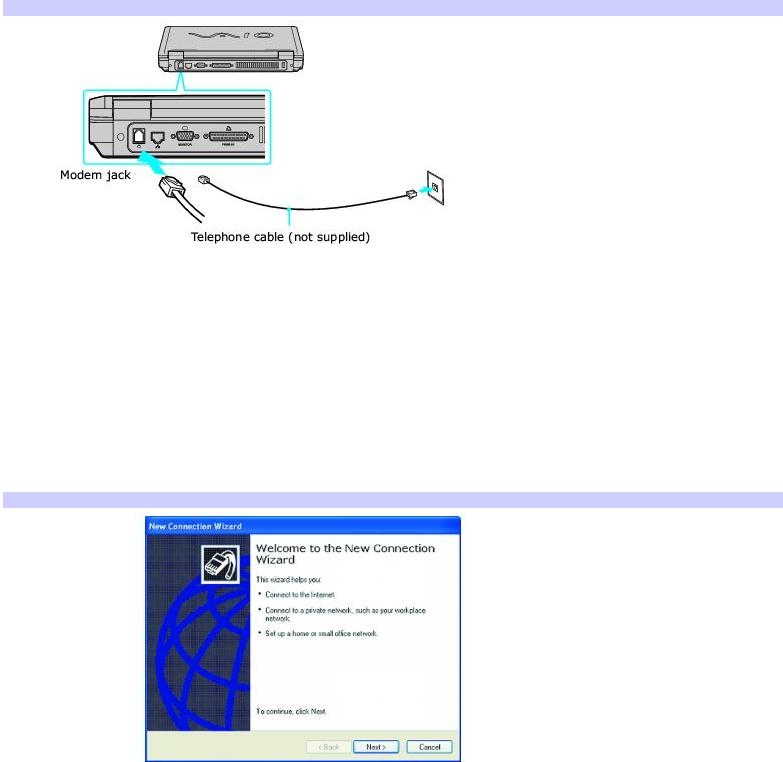
Setting up a dial-up Internet connection
Before you can connect to the Internet, you need to connect your computer to a telephone line via a telephone cable (not supplied). Once you set up your telephone cable, you're ready to connect to the Internet.
To connect a telephone cable
1.Locate the Modem jack on your computer. For location information, see Locating Ports and Controls in the Setting Up chapter of your printed VAIO® Computer Quick Start.
2.Plug one end of the telephone cable into the Modem jack. Make sure it clicks into place.
3.Plug the other end into the wall jack.
Connecting a Telephone Cable
 Your computer does not work with party lines, cannot be connected to a coin-operated telephone, and may not work with multiple telephone lines or a private branch exchange (PBX). Some of these connections may result in excess electrical current and could cause a malfunction in the internal modem.
Your computer does not work with party lines, cannot be connected to a coin-operated telephone, and may not work with multiple telephone lines or a private branch exchange (PBX). Some of these connections may result in excess electrical current and could cause a malfunction in the internal modem.
If you connect a telephone cable coming through a splitter, the modem or connected device may not work properly.
To set up a dial-up connection to the Internet
1.Connect your computer to a telephone line. See To connect a telephone cable for more information.
2.Click Start, point to All Programs, Accessories, Communications, and click New Connection Wizard. The New Connection Wizard appears.
New Connection Wizard
3.Click Next. If the Location Information wizard appears, follow the on-screen instructions, and then close the
Location Information wizard.
4.If it is not already selected, click to select Connect to the Internet, and click Next.
5. Follow the on-screen instructions. |
Page 26 |
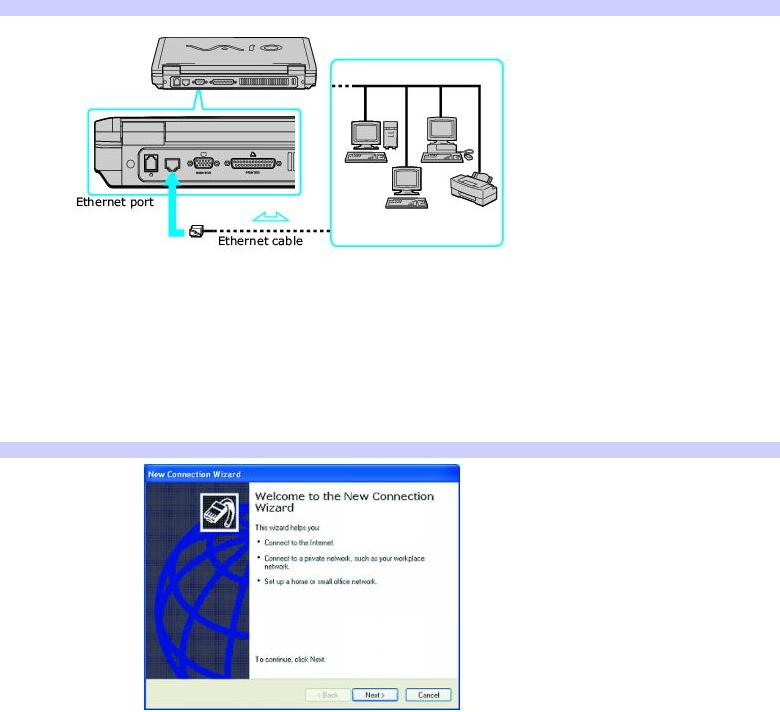
Setting up an Ethernet Internet connection
Your computer accommodates both 10BASE-T and 100BASE-TX Ethernet connections, with data transfer speeds of between 10 and 100 Mbps.
To connect an Ethernet cable
1.Locate the Ethernet port on your computer. For location information, see "Locating Controls and Ports" in the "Setting Up" chapter of your printed VAIO® Computer Quick Start guide.
Connecting an Ethernet Cable
2.Plug one end of the Ethernet cable into your computer's Ethernet port  and the other into the network connection.
and the other into the network connection.
To set up an Ethernet connection to the Internet
1.Connect your computer to a network connection.
2.Click Start, point to All Programs, Accessories, Communications, and click New Connection Wizard. The New Connection Wizard appears.
New Connection Wizard
3.Click Next. If the Location Information wizard appears, follow the on-screen instructions, and then close the
Location Information wizard.
4.If it is not already selected, click to select Connect to the Internet, and click Next.
5.Follow the on-screen instructions.
Page 27
Customizing your Internet connection
The Internet Properties dialog box enables you to change the way you view the Internet. You can change your home page, fonts, language, and colors. You can also regulate content and set browsing preferences.
To open the Internet Properties dialog box
1.Click Start on the Windows® taskbar, and then Control Panel.
2.Click Network and Internet Connections, and then Internet Options. The Internet Properties dialog box appears.
3.Click the tabs to view options.
4.Make changes, and click Apply to activate your changes.
5.Click OK.
Page 28
Frequently asked questions
Why doesn't my modem work?
Make sure the telephone cable is securely plugged into the Modem jack on the computer and the wall jack. See To connect a telephone cable for more information.
Make sure the telephone cable is working. Plug the cable into an ordinary telephone and listen for a dial tone.
Make sure the telephone number the program is dialing is correct.
Make sure the software you are using is compatible with the computer's modem. (All preinstalled Sony programs are compatible.)
Why is my modem connection slow?
Your computer is equipped with a V.90 compatible modem. Many factors may influence modem connection speed, including telephone line noise or compatibility with telephone equipment, such as fax machines or other modems. If you think your modem is not connecting properly to other PC-based modems, fax machines, or your Internet Service Provider (ISP), follow these steps:
Ask your telephone company to verify your telephone line is free of any line noise.
If your problem is fax-related, make sure there are no problems with the fax machine you are calling and that it is compatible with fax modems.
If you are having a problem connecting with your ISP, make sure the ISP is not experiencing technical problems.
If you have a second telephone cable available, try connecting the modem to that cable.
Page 29
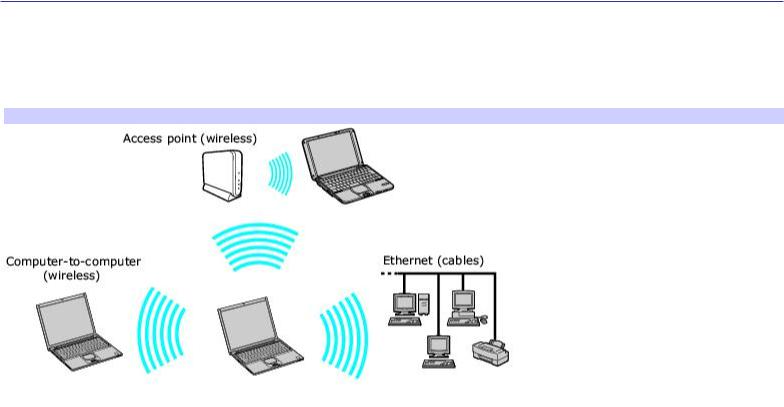
Network Connections
With a Sony computer, you can easily set up or connect to a variety of networks. The New Connection Wizard and Network Setup Wizard make it easy to gain access to remote and local area networks (LANs) using wireless, Ethernet, or dial-up connections. A wireless PC Card (not supplied) is required for wireless network connections.
For more information about networking, click Start, Help and Support, and then Networking and the Web.
Types of Networks*
* The computers represented in this graphic may not be identical to the model you purchased.
Page 30
